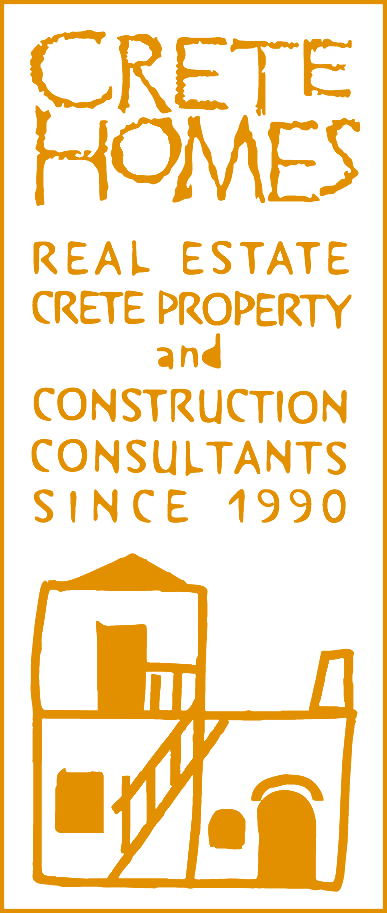FAQ
FAQ – Frequently asked questions
How can we help you? Browse the topics below to find what you are looking for or send as an email at office@crete-homes.com
1. Generic Questions
Our staff speak Greek, English, French, Italian, Russian and we also have German speaking staff available on request.
On your electricity bill there is a small charge for local services, such as road sweeping; there is also a charge for TV licence (whether you have a TV or not). Other basic charges are for water, which providing you do not have many olive trees or a large garden that needs much watering, are not expensive.
Greek banks are reluctant to give mortgages at present, but this may change in the future. It is not particularly recommended unless you already have funds in a Greek bank or have lived or worked for the requested (by that particular bank) time in Greece and can show books authorised by your accountant that you have a reliable income, or can show you have a reliable income coming in from outside Greece.
On the whole, the Cretan people are extremely hospitable and welcoming. Most families build for themselves and do not buy and sell property with the frequency that occurs in other countries and there is no shortage of affordable homes or properties to renovate or land to build upon. It is appreciated however if you learn at least a few words of Greek with which to greet your neighbours.
The Greek language is a beautiful and rich language, but it must be admitted, difficult to learn quickly. It is appreciated however if you learn at least a few words of Greek and you will be the richer yourself for it.
The summers are long and hot, but the “Meltemi” wind keeps things cool. The winters are mild, especially up to the end of the year, but the early three months of the year can be wet. However, apart from in mountainous and hillside areas, there is rarely frost or snow.
Crete does have occasional minor seismic activity and houses are built with this in mind, however, earthquakes are not a major worry or problem here.
Most areas of Crete do not have a problem with water supplies; in those areas that do, extra water tanks/cisterns are recommended. Most villages and towns have taps/fountains that supply delicious spring mountain water.
Unfortunately official unemployment in Crete is high, however, if you are looking for work it is important to get to know as many people as possible, especially related to the type of work you are looking for. To work on an official basis you will need to apply to the police station for a residence permit and pass through the relevant bureaucratic procedures. If you are starting up your own business, bring as much related paperwork as possible.
In addition to your passport and Greek tax number you will need to supply the following details, as applicable.
Proof of income (either via salary pay slip or income tax return)
Proof of current home address and telephone number (via recent utility bill or official home or business premises lease contract)
Proof of profession and current business address (either via foreigner’s residence permit, employer’s certificate, copy of latest salary statement, certificate of profession, profession identity card or social insurance institution receipt).
Additional information may be requested such as the purpose and nature of your business relationship with the bank or information about your economic/transaction profile.
You have to open up the bank account personally, so allow a morning to do that. Usually your chosen lawyer can assist you with this at the bank.
You will need to check with your embassy/consulate as to the present situation, which is constantly changing. If you bring a car which you wish to keep in Crete for longer than the 6 months, then you must change to Greek number plates for a fee.
2. Purchasing Questions
We have the most comprehensive list of available properties and plots of land available in north east Crete, as well as many properties and plots of land throughout the rest of Crete, particularly towards the west of Crete and the South East.
Prices vary immensely and depend on, amongst other things:
- distance from the sea
- whether within or outside village/town plan limits
- if building permit is required
- condition of property
- vendor’s desirability to sell quickly or not
- if the property has a plot of land or a garden
- year of construction
EU-passport holders can buy a property, plot or business. Non EU-passport holders can buy a holiday home. For permanent living, non EU passport holders should contact the Greek Consulate in their home country as to what VISA will be required or if they are able to take advantage of the Golden Visa programme.
Purchase Tax ( 3%) is paid only once and this happens before a property changes ownership.
As a property owner in Greece you are liable to Greek income tax laws and it is very important when you import your purchase money that you retain the receipt from the Bank, to prove that you imported the money and did not earn it within Greece. It is most likely that you will need to employ an Accountant at the end of the tax year, to present a tax declaration for you in the proper manner, so you should not have to pay an income related tax.
There is an annual property tax which depends on size of property and land, location and various other factors.
On a straightforward sale you will need to employ a Lawyer, a Notary and usually for the Lawyer to act as your Power of Attorney, a Land Registry fee and the Real Estate Agent fee.
In some cases we can assist in finding you a property to rent while you look for a property. For a long let, a fee is charged.
For official or advertised or short term letting purposes it is necessary you apply for an E.O. T. (Greek Tourist Board) License and use the services of a good accountant. For Airbnb rentals an E.O.T. License is not required but booking details (such as copy of renter’s passport, length of rental, invoice of payment from Airbnb) must be declared on your Greek tax declaration for each rental. It is recommended that your accountant does this for you.
3. Building/Construction Questions
We will be happy to help you find a plot according to your requirements and budget. Take a look at our listings online or come and see us so that we can recommend the perfect plot for you. We will also help you with the purchase process and make sure that the plot has no problems and can build your dream home.
Our team of architects can evaluate the plot you would like to buy and determine if it is free of any problems that would deem it unsuitable for your building project. They can also advise about possible views, how to limit the effect of the weather, and how to build to the plot’s best potential.
Our company is a ONE STOP SHOP. We combine the advantages of an architectural office and a construction company. We treat the building as a whole and are the single point of contact for the client, managing the project’s design and construction, and sub-contracting to specific known trade persons. With the focus on what is actually happening on the site, a more creative and coherent piece of architecture results.
A general contractor has a general liability policy to cover construction and quality problems. But this is passed down the line to the Sub-Contractors. With Architect-Led Design-Build the Architect accepts full responsibility and working so closely with the general contractor, the potential for problems is greatly reduced.
Architects are sensitive to costs, schedules and materials during design and are more attuned to addressing quality issues during construction. Integration is the key point. The same person who is designing the project is the same person who is managing the project and working with those building it.
We have been in the business for over 30 years and the majority if our customers live abroad, so we are familiar with working via digital means. With technology now making it even easier for us, we can overlook everything and keep you updated regularly, delivering your dream home key in hand!
At the construction phase, we can give you a detailed offer for all the studies, permits and works required, along with the technical description of the works and the materials used. There is no charge for the supervision.
The price per square meter depends on the size of the building, the slope of the plot and the environment (rock, sand etc.), the location of the plot, the quality of materials used, the existence of a swimming pool, and the kind of work required for the exterior (pergolas, patios etc.) and landscaping. The best approach would be to start with a budget and work according to that.
There is a building permit, workers’ IKA (National Insurance Stamp) plus the usual Lawyer, Notary and Power of Attorney fees. There are strict rules now about and building and renovating and it is advised you employ an Architect/Civil Engineer to apply for the building permit.
It is well known that part of the Cretan charm is a slightly laid back attitude and sometimes a lack of urgency. This is why you want to live in Crete!! It is wise to use established Architects, such as ourselves in order to ensure the reliability and professionalism of the people working on your house.
Obviously you are free to bring with you anybody who can assist you, however much of the paperwork involved with building a house requires the stamp by an official/Greek recognised professional. This is why it is probably more advisable to employ a registered Architect who can recommend suitable electricians/plumbers and so on and oversee the project and works.


